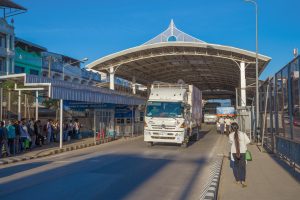Myanmar’s military junta will reportedly no longer allow men to go overseas for employment purposes if they are eligible for military conscription, an apparent bid to stem the flow of young people seeking to evade the unpopular draft.
The news was reported by the local media outlet Myanmar Now, which quoted Nyunt Win, the permanent secretary of the military administration’s Ministry of Labor, as saying that the ban had been introduced.
“When we will lift it depends on prevailing circumstances,” he told the publication. “That’s all I can say for now.” Nyunt Win added that those who had already gained approval to go abroad would be exempt from the ban.
Myanmar Now was alerted to the possible shift by a source that attended an April 30 meeting between Nyunt Win’s boss, Labor Minister Myint Naung, and officials of the Association of Employment Agencies in Yangon. The source said the minister “complained that too many youths were leaving the country to avoid the conscription law.”
No official announcement of the policy has yet been made, but if true, it is a clear attempt to prevent young men from evading conscription, which the junta announced in mid-February in an apparent bid to strengthen the army’s depleted ranks following a series of major battlefield reverses, particularly in Shan and Rakhine states.
Under the People’s Military Service Law, which was passed in 2010, men between the ages of 18 and 45 and women aged 18-35 can be drafted into the armed forces for two years, a period extendable to five years during national emergencies. The junta said that it aimed to conscript the first batch of 5,000 recruits last month. According to Myanmar Now, it has already begun summoning its second batch of 5,000 draftees.
By announcing the policy, the military presented every young person in the country with a choice: serve when called upon, go to prison, or find some other way of avoiding the draft. It is no surprise that most have sought the latter option, given the deep popular revulsion for the current military regime and the army’s history of using civilians as conflict porters and mine-sweepers.
Since the policy was announced, untold thousands of young people have attempted to flee the country, either through official channels – by applying for a permit to work in Thailand, where there are around 2.3 million workers from Myanmar – or by crossing the porous border with Thailand illegally. Others have also escaped to border areas under the control of ethnic armed groups opposed to the military junta, with some choosing to join People’s Defense Forces aligned with the opposition National Unity Government.
The conscription drive has also inflamed corruption, with many junta administrators accepting bribes in order to exempt eligible candidates from the draft.
The policy shift is a clear case of the junta introducing a new repressive law to counter the effects of a previous repressive law. As in past cases, the ban on overseas employment is likely to have unintended consequences, increasing the numbers of desperate people willing to attempt illegal border crossings or join PDFs in areas under resistance control.

































